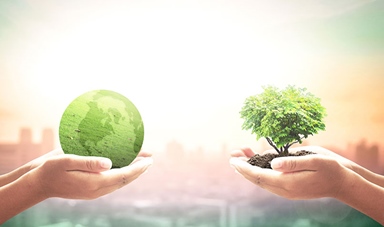Loading component...
At a glance
The corporate world has changed since economist Milton Friedman famously pronounced in 1970 that the only social responsibility of business was to maximise profits.
While that statement has guided much economic investment over the past 50 years, now more businesses and governments are engaging in ethical investing – in the pursuit of both financial returns and socially desirable outcomes.
The term environmental, social and corporate governance (ESG) was first outlined in 2005 in a UN Global Impact report Who Cares Wins, making the case that embedding these factors in capital markets makes good business sense and leads to more sustainable markets and better outcomes for societies.
Today, ESG investments are estimated to account for more than US$30 trillion, or about a quarter of all professionally managed assets around the world.
However, the world is changing rapidly due to the COVID-19 pandemic, which has created havoc with the global economy. Could ethical investments play a crucial role in recovery efforts and make the new world a better place?
Ethical investment: Not a black and white issue
An important consideration for ethical investment is that it is not a black and white issue. This is a point stressed by economist Dr Dambisa Moyo, who spoke at CPA Virtual Congress in November 2019.
For nearly three decades, Moyo has influenced key decision-makers in strategic investment and public policy, writing extensively on the creation of wealth and the perpetuation of poverty in the global economy.
Moyo, who has a Doctorate in Economics from Oxford University, and a master’s from Harvard's Kennedy School of Government, has been a consultant to the World Bank and worked for Goldman Sachs in London.
Moyo says that the past decade has shown an increasing focus on ethical investment.
“Investment has clearly changed in the last 10 years and corporations are now expected to not only make profits, but also to lead in areas such as education, healthcare, the environment, and this year, pandemics,” she says.
“However, I think the more sophisticated investors are fully aware that there's a nuance to these public policy issues. The people who don't understand this will miss real opportunities.”
Investment in alternative energy solutions is an example. Moyo argues that while few energy company leaders would disagree with the threat of climate change, the discussion around energy transition does not tend to reflect the fact that there are about 1.2 billion people across the planet who have no access to cost-effective, reliable, scalable energy.
“Look at what's happening across the emerging markets with load shedding, where energy is not easily accessible for the whole population,” she says.
“This results in increased costs of education and healthcare, especially in the era of COVID. So, there are real implications for this kind of cavalier attitude in dealing with public policy.
“The challenges the global economy faces with general public policy issues such as this, is that they always have trade-offs,” adds Moyo.
“The implications of not looking at them in a nuanced way means that we generally create other [second-order] problems, such as immigration, as people start to try and escape economic and political collapse in their countries.”
There are other trade-offs to consider, says Moyo. “For instance, it's very easy for people to say, ‘I don't want to invest in a military company’. But do they think the government should be providing them with security? They would probably say ‘yes, I should be secure. I'm a citizen. I pay taxes’.
"It's those types of trade-offs that I think we need to be a bit more au fait with and sensible about – these things are very grey.”
COVID-19 meets corporate citizenship
A global response to the pandemic is essential to help reduce harmful impacts, including addressing deepening social inequalities, the direct effect on public health and the severity of the associated economic slowdown.
Rather than focusing on “quick wins” to recover losses at the expense of long-term ethical investment decision-making, Moyo says she is “sanguine about how companies and investors are behaving”.
“When September 11 happened, there was a sense of common decency and nobody needed regulators to say, ‘please don’t trade’. Of course, the event had a significant impact on the stock and bond markets, but there were morals and ethics at play.
“I think companies are behaving, on the whole, pretty ethically right now,” she says. “Many companies, and not just pharmaceutical ones, are coming up with solutions and ideas to help during the pandemic.”
As the world rapidly becomes more digital, COVID-19 has also highlighted the role companies can play in the broader context of good citizenship, says Moyo.
“The bottom line is we remain in a highly connected digital world and we were already forecasting that people will have much more of a focus on where companies are sourcing their goods, how much money they are paying their average workers, how much water they are using and how much CO2 [carbon dioxide] they are emitting,” she says.
“Fundamentally, COVID has accelerated a lot of the changes that people were already thinking about.”

